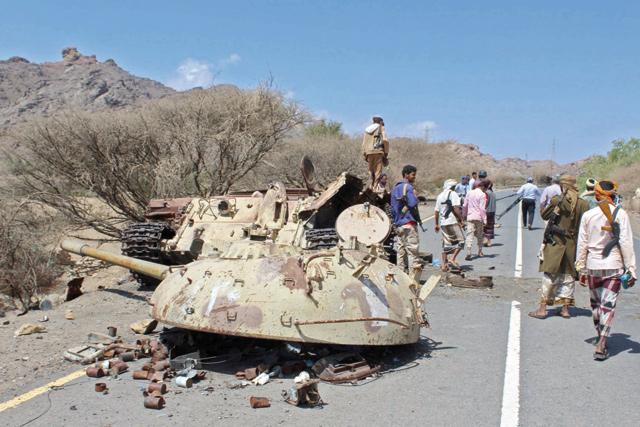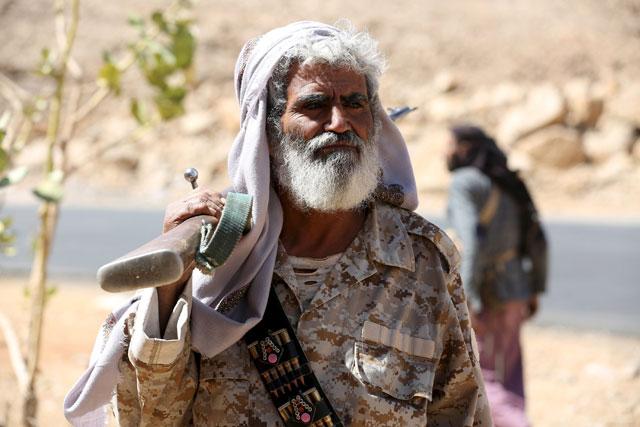You are here
10 UAE-backed troops killed in Yemen extremist attack
By AFP - Mar 29,2018 - Last updated at Mar 29,2018

Yemeni fighters loyal to the government backed by the Saudi-led coalition gather around the destroyed turret and body of a tank, near the town of Al Shurayja in the southern Lahij province, about 66 kilometres southwest of the city of Taez, on Tuesday (AFP photo)
ADEN, Yemen — Ten Yemeni soldiers trained and backed by the United Arab Emirates were killed on Wednesday in an attack by armed extremists in southwest Yemen, military and medical sources said.
Five gunmen were also killed in the attack on a military post in the Hajr district of the port city Mukalla, a high-ranking military source said on condition of anonymity.
A source at the Ibn Sina Military Hospital in Mukalla confirmed that 10 soldiers had been pronounced dead after the attack.
Mukalla, located on the Gulf of Aden, has been controlled by the Saudi-backed government of President Abed Rabbo Mansour Hadi since 2016, when Al Qaeda's branch in Yemen withdrew from the city.
The UAE is a key member of a military coalition, led by Saudi Arabia, which has fought alongside the Yemeni government against Yemen's Houthi rebels as well as extremist groups.
The UAE trains and supports elite forces in southeast and southwest Yemen, including brigades stationed in Mukalla known as "Quwat Al Nokhba".
The troops were key in driving Al Qaeda in the Arabian Peninsula (AQAP) out of Mukalla in April 2016, one year after they overran the coastal city in the midst of Yemen's civil war.
Extremist networks, including AQAP and Daesh, have exploited the Yemen war to expand their presence in pockets across southern Yemen.
Military outposts have been regularly targeted by suicide bombings and armed attacks, some of them claimed by AQAP or Daesh.
The Yemen war has claimed nearly 10,000 lives since Saudi and its allies joined the conflict in March 2015, triggering what the United Nations has called the world's worst humanitarian crisis.
Related Articles
ADEN — Al Qaeda fighters have retreated from an oil-rich southern province of war-ravaged Yemen in the face of an assault by an elite US-bac
ADEN — Suicide bombings killed 11 people Monday at two army checkpoints in Al Qaeda's former stronghold in southeastern Yemen, officials sai
ADEN — Al Qaeda overran a police headquarters in a south Yemen provincial capital on Saturday, strengthening their grip on the coast road ov













